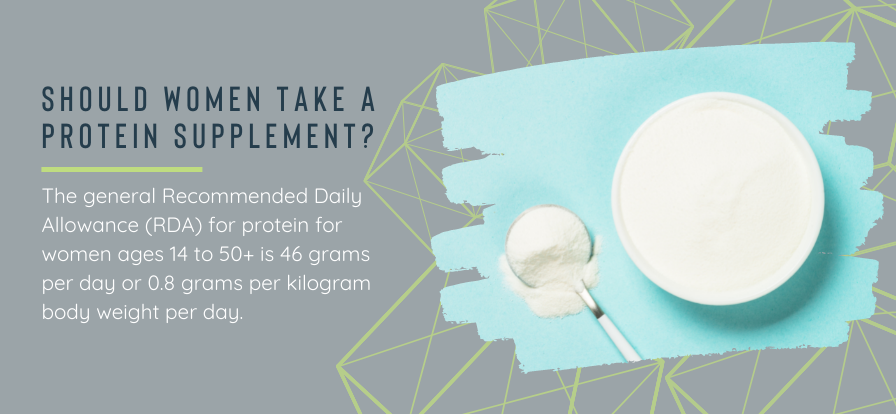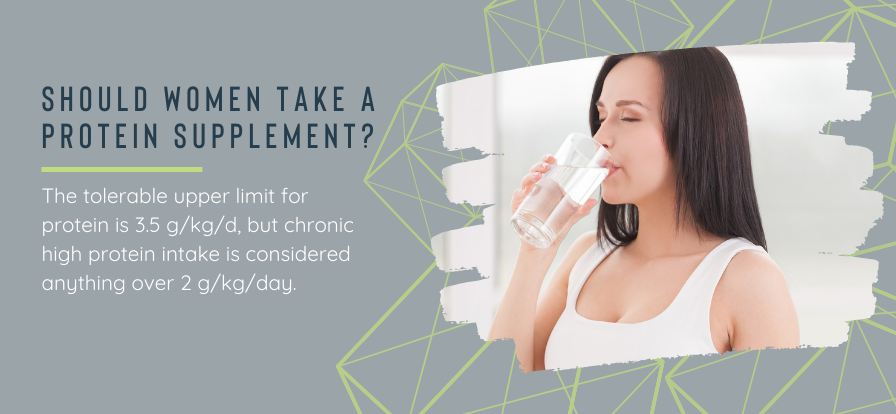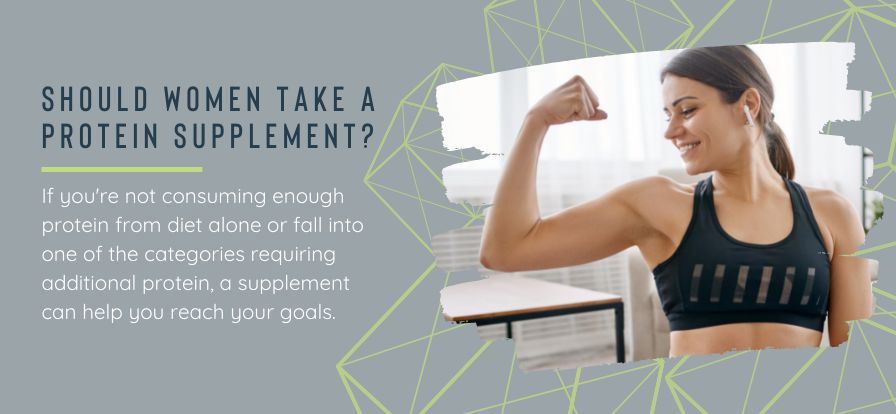Should Women Take a Protein Supplement?
Written by Stephanie Hodges, MS in Nutrition and Exercise Science, Edited by Martin Ebner, head Personal trainer and sports nutrition specialist at Ebylife.
Most women know that protein is a crucial part of a healthy diet and is essential for building muscle and maintaining a healthy weight. But when you hear the term "protein supplement," you may have a preconceived notion that supplements are only for bulky guys trying to build the biggest muscles possible.
So what about the ladies? Or those who aren't necessarily aiming for huge muscles but looking to get leaner and stronger – should they take a protein supplement?
In this blog post, we’ll clear up the confusion, discuss the benefits of protein for women, and look at protein sources from food and supplements. And we’ll weigh in on the question of whether or not women should take a protein supplement!
Related article: Complete Protein Supplements Guide: Everything you need to know about protein for fitness goals
Why Do Women Need Protein?
Protein is an essential nutrient for our bodies, made up of amino acids. These amino acids are necessary for repairing tissue, providing structure, maintaining fluid balance, making enzymes, and creating hormones.
In biology, essential doesn't just mean "important," but signifies that you have to consume that nutrient in food because your body can't make it. Your body needs 20 amino acids, and nine are considered "essential," so you must get them from the protein in the food you eat.
Protein is found in every cell in your body and plays an integral role in countless biochemical processes. So it's no wonder that protein is called the building block of life.
Protein is vital for growth and development in children and teens. And as we age, protein becomes increasingly crucial for maintaining muscle mass.
Our body constantly recycles proteins but needs a positive net protein balance to build muscle. So, we have to be consuming more protein than our bodies are breaking down to increase our lean muscle mass. This protein balance enables healthy protein muscle synthesis, the metabolic process of incorporating amino acids into skeletal muscle tissue.
How Much Protein Do Women Need?
We'll say up front that everyone's body is unique and, therefore, their protein needs are different. In addition, the amount of protein you need depends on age, activity level, and muscle mass and could be affected by underlying health conditions (in which case, you need to follow the advice of your physician).
The general Recommended Daily Allowance (RDA) for protein for women ages 14 to 50+ is 46 grams per day or 0.8 grams per kilogram body weight per day (0.35 grams per pound body weight).
Infants and children have higher protein needs in ratio to their weight. Also, women need more protein during the second and third trimesters of pregnancy and while lactating. Therefore, an intake of 71 grams of protein per day is recommended during these times.
Remember that the RDA is the bare minimum amount of nutrition recommended for the general population to stay healthy. Sometimes the RDA isn't enough, especially when it comes to protein!
Another thing to consider is that experts recommend consuming smaller portions of protein throughout the day. For example, 25-35 g of protein (the amount in approximately 4 ounces of chicken) per meal has been recommended for older adults to maximize absorption and muscle protein synthesis.
When Does a Woman Need More than the RDA for Protein?
There are a few instances when a woman might need more than the recommended 0.8 g/kg/day of protein. Here are a few examples.
During pregnancy and lactation. As we already mentioned, protein is vital for growing infants and maintaining a pregnant mother's health. So women should bump up to 1.10 g/kg/d of protein during the second and third trimesters and 1.30 g/kg/d during lactation.
Over the age of 65: Women in this age group tend to be more sedentary and have a higher risk of sarcopenia (age-related muscle loss). A protein intake of 1.0-1.5 g/kg/day has been recommended for women over 65 years to help preserve muscle mass.
Female athletes: The Academy of Nutrition and Dietetics and the American College of Sports Medicine (ACSM) recommends 1.2 to 2.0 grams of protein per kilogram of body weight per day for athletes, depending on training type, duration, and intensity.
If you are trying to lose weight. You want to make sure that you're losing fat, not muscle, and maintaining a healthy body composition. Numerous studies have shown that high protein diets help maintain muscle mass and prevent weight regain following weight loss programs for overweight subjects and older adults.
Related article: How to Optimise Intermittent Fasting for Fat Burning
Can Women Consume Too Much Protein?
Remember that a protein supplement won't magically convert to lean muscle in your body. In reality, you will gain weight if you eat too many calories, whether protein, fat, or carbohydrate.
Muscle growth requires a combination of adequate protein intake plus strength training that overloads the muscle. Also, remember that genetics and hormones play a role (and will naturally limit women's muscle growth).
So in one sense, women shouldn't fear that they'll bulk up by consuming more protein; it just doesn't work that way. On the other hand, you can't expect to lose weight, sculpt lean muscles, and get a toned physique unless you do regular resistance training.
How much protein is too much? The tolerable upper limit for protein is 3.5 g/kg/d, but chronic high protein intake is considered anything over 2 g/kg/day.
Eating high amounts of protein usually won't hurt you but will be excreted in your urine as urea. Over time, this can lead to dehydration and cause kidney strain. Excess protein may also tax your liver and pancreas and cause digestive issues.
Although some would dispute these concerns, there isn't any documented benefit to going beyond 2.0 g/kg/day of protein. So to be safe, stay under that level and maintain your protein intake at 10-35% of your daily energy intake, which is 200-700 calories in a 2,000-calorie daily diet.
Calculating Your Protein Needs
To determine your ideal intake, take a minute to calculate your protein needs based on your body weight.
For example, if you are a 150 lb/68 kg woman trying to lose weight and maintain your muscle mass, you might aim for 1.0-1.5 g/kg/d protein.
1.0 g x 68 kg = 68 grams protein
1.5 g x 68 kg = 102 grams
So your goal is 68-102 grams of protein per day. Since there are four calories per gram of protein, that means 272-408 calories out of your total daily calorie intake should come from protein.
When Do Women Need a Protein Supplement?
Meeting your daily protein needs through whole foods is ideal. But sometimes, you're not able to get all the protein you need from your diet alone, don't enjoy high-protein foods, or need the convenience of a shake or bar to grab on the go.
If you want to consume 100 grams of protein from food, here's an example* of what that looks like:
2 eggs - 14 g
2 cups Greek yogurt - 20 g
4 oz chicken breast - 25 g
1 cup cottage cheese - 20 g
1 oz almonds - 6 g
1 cup beans - 15 g
(*Check food labels and portion sizes for exact protein content in the foods you consume.)
Foods that contain the highest amount of protein per serving include meat, seafood, dairy, eggs, nuts, seeds, beans, and legumes.
For some women, that could be a lot of food to consume daily, and protein supplements could be a helpful solution.
Protein shakes, and protein bars are popular choices for getting extra protein. However, remember that not all supplements are created equal – some have added sugars, unhealthy fats, and other ingredients you don't want. So read the nutrition label and ingredient list carefully before buying.
The Bottom Line on Protein Supplements
Protein is essential for women who want to lose weight and tone up and won't make you bulky or gain weight if you're eating the right amount and balancing your calories and energy expenditure.
If you're not consuming enough protein from diet alone or fall into one of the categories requiring additional protein, a supplement can help you reach your goals. Just be sure to choose a clean, healthy option.
Our friends at Amandean have great options available for high-quality protein! We recommend their Marine collagen, bovine collagen, and beef gelatin to help you reach your protein intake goals. These products also come with a host of other health and beauty benefits (like improving hair, skin, and nails).
References:
Gropper, Sareen. Advanced Nutrition and Human Metabolism, Seventh ed., Cengage Learning, Boston, MA, 2018,
Additional protein intake limits weight regain after weight loss in humans: https://www.cambridge.org/core/journals/british-journal-of-nutrition/article/additional-protein-intake-limits-weight-regain-after-weight-loss-in-humans/29CB9EE1953ABE6A05000A80B3F19B73
Effects of dietary protein intake on body composition changes after weight loss in older adults: a systematic review and meta-analysis. https://academic.oup.com/nutritionreviews/article/74/3/210/1825906?login=true
Dietary protein intake and human health. https://pubmed.ncbi.nlm.nih.gov/26797090/




